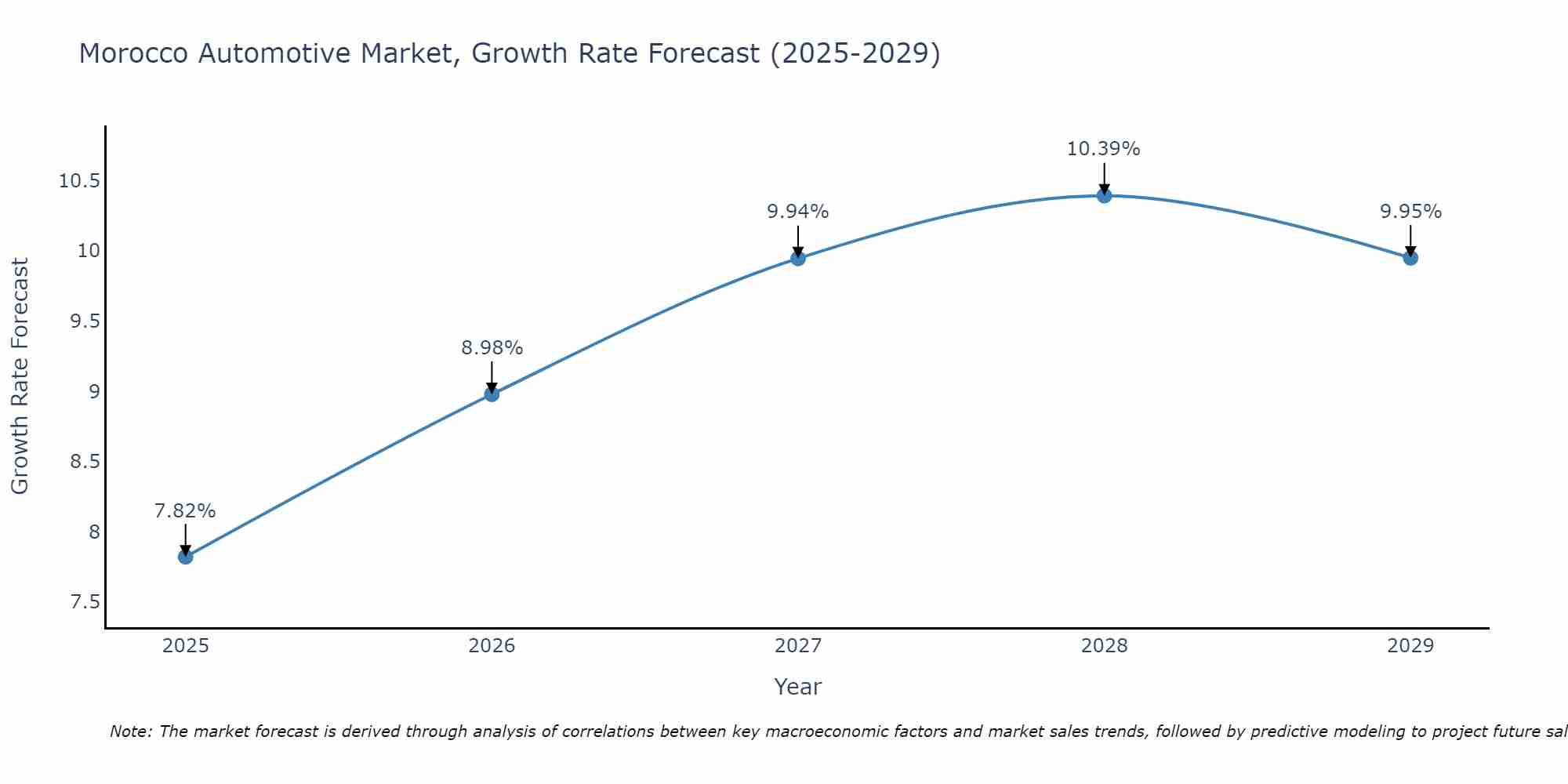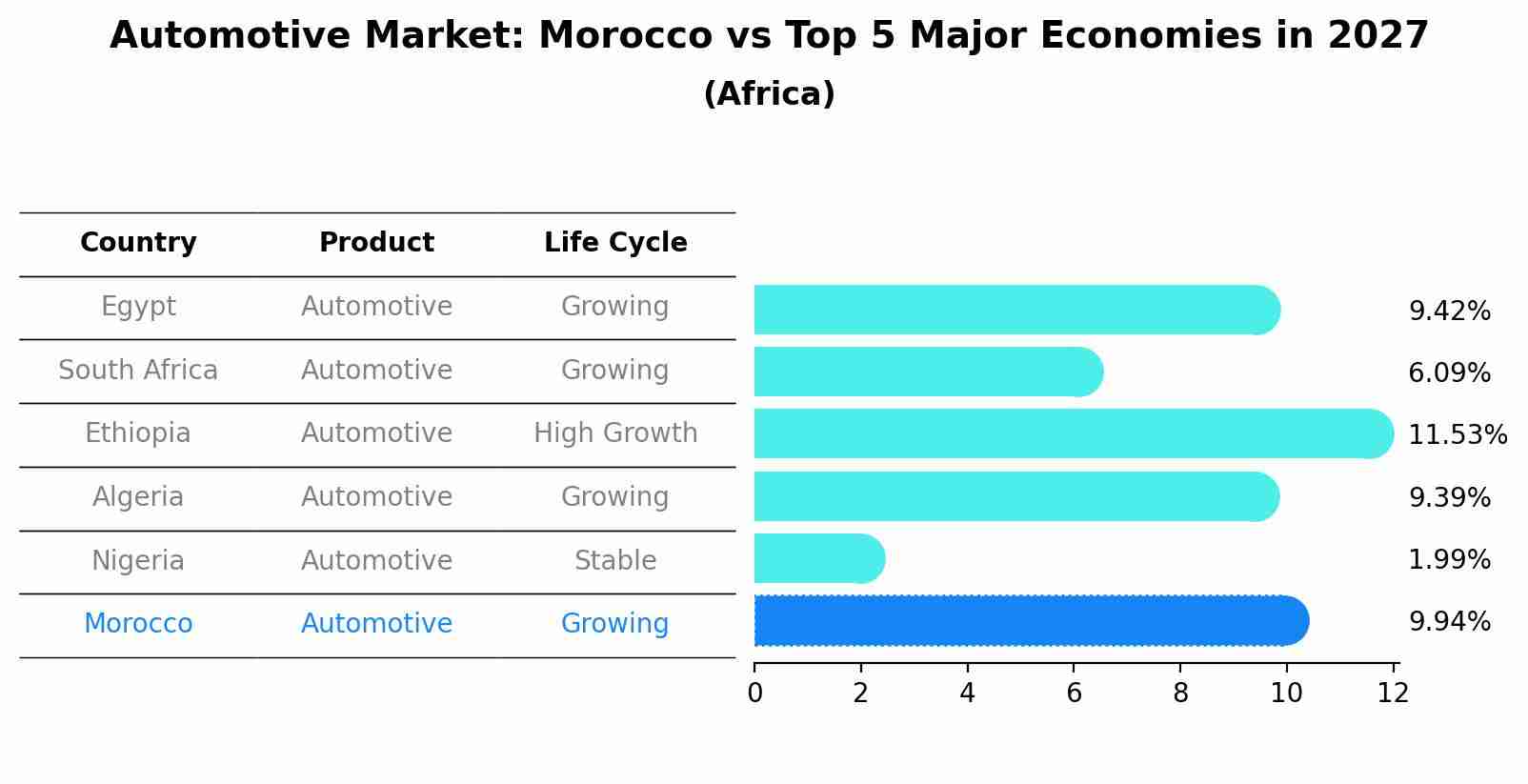Morocco Automotive Market Outlook | COVID-19 IMPACT, Companies, Trends, Industry, Revenue, Size, Value, Analysis, Forecast, Share & Growth
| Product Code: ETC431809 | Publication Date: Oct 2022 | Updated Date: Jul 2025 | Product Type: Market Research Report | |
| Publisher: 6Wresearch | Author: Sachin Kumar Rai | No. of Pages: 75 | No. of Figures: 35 | No. of Tables: 20 |
Morocco Automotive Market Size Growth Rate
The Morocco Automotive Market is projected to witness mixed growth rate patterns during 2025 to 2029. The growth rate begins at 7.82% in 2025, climbs to a high of 10.39% in 2028, and moderates to 9.95% by 2029.

Automotive Market: Morocco vs Top 5 Major Economies in 2027 (Africa)
Morocco's Automotive market is anticipated to experience a growing growth rate of 9.94% by 2027, reflecting trends observed in the largest economy Egypt, followed by South Africa, Ethiopia, Algeria and Nigeria.

Morocco Automotive Market Synopsis
The Morocco Automotive Market has been experiencing steady growth in recent years, driven by factors such as increasing disposable income, urbanization, and government incentives for the automotive industry. The market is characterized by a strong demand for both new and used vehicles, with passenger cars dominating sales. International automakers have also been establishing production facilities in the country, contributing to the growth of the automotive sector. Additionally, there is a growing trend towards electric and hybrid vehicles in Morocco, supported by government initiatives to promote sustainable transportation. As the market continues to evolve, opportunities for automotive manufacturers and suppliers abound in this dynamic and expanding industry landscape.
Morocco Automotive Market Trends
The Morocco automotive market is experiencing several notable trends. One key trend is the growing demand for electric vehicles (EVs) and hybrid cars, driven by increasing environmental awareness and government incentives to reduce emissions. Another trend is the rising popularity of SUVs and crossovers, reflecting consumer preferences for spacious and versatile vehicles. Additionally, there is a noticeable shift towards digitalization and connectivity features in vehicles, with more advanced infotainment systems and driver assistance technologies being incorporated. The aftermarket automotive industry is also witnessing growth, with a focus on customization and performance enhancements. Overall, the Morocco automotive market is evolving towards more sustainable, technologically advanced, and personalized vehicle options to meet the changing preferences and needs of consumers.
Morocco Automotive Market Challenges
The Morocco Automotive Market faces challenges such as high import tariffs on vehicles and parts, which increase the cost of production and hinder competitiveness. Additionally, the lack of a strong local supply chain limits the availability of locally sourced components, leading to a reliance on imports. Infrastructure issues, such as inadequate road networks and limited access to quality fuel, also impact the market. Furthermore, regulatory barriers and bureaucratic processes can create obstacles for foreign investment and business operations. The market also faces competition from used car imports, which can affect new car sales. Overall, addressing these challenges will be crucial for the sustainable growth and development of the Morocco Automotive Market.
Morocco Automotive Market Investment Opportunities
The Morocco automotive market offers promising investment opportunities due to several factors, such as the country`s strategic location as a gateway between Europe and Africa, a growing middle class with increasing purchasing power, and government incentives to attract foreign investment in the automotive sector. With a strong focus on developing the automotive industry, Morocco has become a competitive manufacturing hub, attracting global automakers and suppliers. Investment opportunities exist in setting up manufacturing plants, expanding distribution networks, investing in research and development for electric vehicles and sustainable technologies, as well as supplying components and aftermarket services. Additionally, Morocco benefits from free trade agreements with several countries, providing access to a larger market potential. Overall, the Morocco automotive market presents a favorable environment for investors seeking growth and diversification within the industry.
Jordan Agar Market Government Policies
The Moroccan government has implemented various policies to support and develop the automotive market in the country. These include incentives such as tax breaks, investment subsidies, and free trade agreements to attract foreign investment and boost local production. Additionally, the government has focused on developing infrastructure and creating automotive industrial zones to encourage growth in the sector. In line with environmental concerns, Morocco has also introduced regulations promoting the use of electric and hybrid vehicles. Overall, these policies aim to strengthen the automotive industry, create job opportunities, and enhance competitiveness in both the local and international markets.
Morocco Automotive Market Future Outlook
The future outlook for the Morocco Automotive Market appears promising, with continued growth expected in the coming years. Factors such as increasing disposable income, a growing middle class, and government initiatives to support the automotive industry are likely to drive demand for vehicles in the country. Additionally, Morocco`s strategic location as a gateway to Africa and its established automotive manufacturing hub are attracting investments from global automotive companies. The shift towards electric and hybrid vehicles, along with advancements in autonomous driving technology, are also anticipated to shape the market`s future landscape. Overall, the Morocco Automotive Market is poised for expansion and innovation, offering opportunities for both domestic and international players to thrive in the evolving automotive sector.
Key Highlights of the Report:
- Morocco Automotive Market Outlook
- Market Size of Morocco Automotive Market, 2021
- Forecast of Morocco Automotive Market, 2031
- Historical Data and Forecast of Morocco Automotive Revenues & Volume for the Period 2018 - 2031
- Morocco Automotive Market Trend Evolution
- Morocco Automotive Market Drivers and Challenges
- Morocco Automotive Price Trends
- Morocco Automotive Porter's Five Forces
- Morocco Automotive Industry Life Cycle
- Historical Data and Forecast of Morocco Automotive Market Revenues & Volume By Product Type for the Period 2018 - 2031
- Historical Data and Forecast of Morocco Automotive Market Revenues & Volume By Electric for the Period 2018 - 2031
- Historical Data and Forecast of Morocco Automotive Market Revenues & Volume By Hybrid Electric for the Period 2018 - 2031
- Historical Data and Forecast of Morocco Automotive Market Revenues & Volume By Plug-In Hybrid Electric for the Period 2018 - 2031
- Historical Data and Forecast of Morocco Automotive Market Revenues & Volume By Mild Hybrid for the Period 2018 - 2031
- Historical Data and Forecast of Morocco Automotive Market Revenues & Volume By Natural Gas for the Period 2018 - 2031
- Historical Data and Forecast of Morocco Automotive Market Revenues & Volume By Fuel Cell Electric for the Period 2018 - 2031
- Historical Data and Forecast of Morocco Automotive Market Revenues & Volume By Diesel for the Period 2018 - 2031
- Historical Data and Forecast of Morocco Electric Automotive Market Revenues & Volume By Petrol for the Period 2018 - 2031
- Morocco Automotive Import Export Trade Statistics
- Market Opportunity Assessment By Product Type
- Morocco Automotive Top Companies Market Share
- Morocco Automotive Competitive Benchmarking By Technical and Operational Parameters
- Morocco Automotive Company Profiles
- Morocco Automotive Key Strategic Recommendations
Frequently Asked Questions About the Market Study (FAQs):
- Single User License$ 1,995
- Department License$ 2,400
- Site License$ 3,120
- Global License$ 3,795
Search
Thought Leadership and Analyst Meet
Our Clients
Related Reports
- Afghanistan Rocking Chairs And Adirondack Chairs Market (2026-2032) | Size & Revenue, Competitive Landscape, Share, Segmentation, Industry, Value, Outlook, Analysis, Trends, Growth, Forecast, Companies
- Afghanistan Apparel Market (2026-2032) | Growth, Outlook, Industry, Segmentation, Forecast, Size, Companies, Trends, Value, Share, Analysis & Revenue
- Canada Oil and Gas Market (2026-2032) | Share, Segmentation, Value, Industry, Trends, Forecast, Analysis, Size & Revenue, Growth, Competitive Landscape, Outlook, Companies
- Germany Breakfast Food Market (2026-2032) | Industry, Share, Growth, Size, Companies, Value, Analysis, Revenue, Trends, Forecast & Outlook
- Australia Briquette Market (2025-2031) | Growth, Size, Revenue, Forecast, Analysis, Trends, Value, Share, Industry & Companies
- Vietnam System Integrator Market (2025-2031) | Size, Companies, Analysis, Industry, Value, Forecast, Growth, Trends, Revenue & Share
- ASEAN and Thailand Brain Health Supplements Market (2025-2031) | Strategy, Consumer Insights, Analysis, Investment Trends, Opportunities, Growth, Size, Share, Industry, Revenue, Segments, Value, Segmentation, Supply, Forecast, Restraints, Outlook, Competition, Drivers, Trends, Demand, Pricing Analysis, Competitive, Strategic Insights, Companies, Challenges
- ASEAN Bearings Market (2025-2031) | Strategy, Consumer Insights, Analysis, Investment Trends, Opportunities, Growth, Size, Share, Industry, Revenue, Segments, Value, Segmentation, Supply, Forecast, Restraints, Outlook, Competition, Drivers, Trends, Demand, Pricing Analysis, Competitive, Strategic Insights, Companies, Challenges
- Europe Flooring Market (2025-2031) | Outlook, Share, Industry, Trends, Forecast, Companies, Revenue, Size, Analysis, Growth & Value
- Saudi Arabia Manlift Market (2025-2031) | Outlook, Size, Growth, Trends, Companies, Industry, Revenue, Value, Share, Forecast & Analysis
Industry Events and Analyst Meet
Whitepaper
- Middle East & Africa Commercial Security Market Click here to view more.
- Middle East & Africa Fire Safety Systems & Equipment Market Click here to view more.
- GCC Drone Market Click here to view more.
- Middle East Lighting Fixture Market Click here to view more.
- GCC Physical & Perimeter Security Market Click here to view more.
6WResearch In News
- Doha a strategic location for EV manufacturing hub: IPA Qatar
- Demand for luxury TVs surging in the GCC, says Samsung
- Empowering Growth: The Thriving Journey of Bangladesh’s Cable Industry
- Demand for luxury TVs surging in the GCC, says Samsung
- Video call with a traditional healer? Once unthinkable, it’s now common in South Africa
- Intelligent Buildings To Smooth GCC’s Path To Net Zero


















